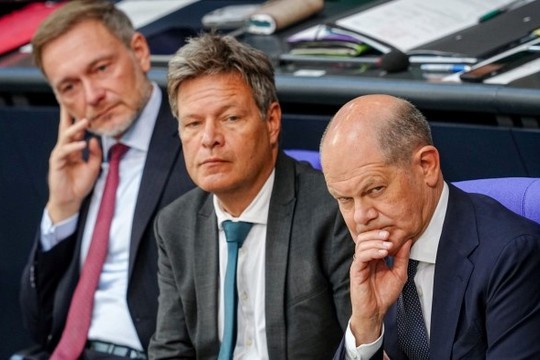Christian Lindner, FDP leader and finance minister, left, with Robert Habeck, economy minister from the Greens, centre, and German Chancellor Olaf Scholz of the SPD at a debate in the Berlin Bundestag
Photo: DPA
Chancellor Olaf Scholz held a much-vaunted “industrial summit”, sitting down with business leaders and union bosses to figure out how to pull Germany out of its current malaise. Pointedly left off the guest list: his own finance and economy ministers.
Robert Habeck, the economy minister, responded by unveiling plans for a multibillion-euro, debt-financed investment fund — an idea not previously discussed with cabinet colleagues — while finance minister Christian Lindner simply scheduled his own, rival business summit on the same day.
The duel of the summits, against the backdrop of a stagnating economy and Volkswagen mulling domestic factory closures for the first time in its history, symbolises the disarray at the heart of Scholz’s coalition — a loveless marriage that increasingly seems on the verge of divorce, writes ‘The Financial Times’.
Speculation is growing in Berlin that the alliance could soon collapse, pulled apart by its own internal contradictions. Several German media outlets have even named a possible date for snap elections — March 9, more than six months ahead of schedule.
There is also a clear potential trigger for a break-up — a failure to agree on a budget for 2025. Negotiations have been fraught: the government’s draft spending plan features a financing gap of nearly €10bn and the coalition partners are hopelessly split on how to plug it ahead of a November 14 deadline.
But Scholz loyalists say they have little choice but to keep trying. “The coalition is like a couple that has separated but still has to figure out how to raise the kids together,” said one senior SPD MP. “Regardless of our differences, we have to thrash this budget out and get it done.”
Meanwhile, talk of snap elections ignores one important factor — Donald Trump.
Many in Berlin say a victory for the Republican candidate in next week’s US presidential election will deliver such a shock to the German political system — and the transatlantic alliance — that it’ll galvanise Scholz’s coalition into closing ranks and soldiering on.
“A Trump win massively reduces the likelihood that the coalition will break apart,” said one senior Green MP. “Germany would have to step up and show some leadership, and it can’t do that if there’s chaos here.”
France also showed the potential pitfalls of early elections after President Emmanuel Macron called snap polls this summer.
“In that case, we saw how they led to a long political impasse,” said Johannes Fechner, a senior SPD MP.
“We have a government, a clear majority in parliament and the motivation to pass legislation. All coalition parties are responsible for working together to improve people’s lives — so why should the Greens or FDP have any interest in leaving early?”
The coalition partners weren’t always at loggerheads. They started off in 2021 promising to breathe new life into a political system lulled into lethargy by Angela Merkel’s 16-year rule, embracing a progressive agenda for modernising the creaking German state and greening its economy.
But with time their interests diverged. For the Greens, the priority was mitigating climate change, for the SPD preserving the welfare state and for the fiscally hawkish FDP upholding Germany’s strict rules on deficits and debt.
Increasingly, these aspirations collided, causing near-constant strife. Relations were not helped by the partners’ plunging approval ratings and the surge in support for populist parties of the hard-left and extreme-right.
“The problem is that the closer we get to the election, the less we seem to have in common,” said one FDP MP. “It’s all just campaigning now.”
“The coalition must come together — and I emphasise together — to enact the right economic policy,” said Rainer Dulger, head of Germany’s employers’ federation, the BDA. “That means making Germany’s economy competitive again.”
But others are losing hope.
“We would like them to act in concert,” said an executive at one of the leading business lobbies. “But right now, it’s every man for himself.”
read more in our Telegram-channel https://t.me/The_International_Affairs

 11:39 02.11.2024 •
11:39 02.11.2024 •























